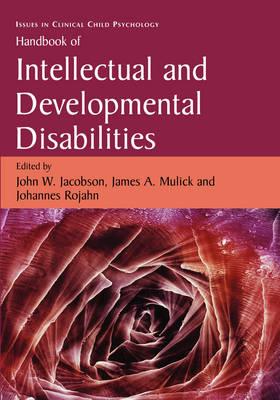Overview
Changes within the interdisciplinary field of intellectual and developmental disabilities are evolving at a rapid pace. Clinicians, academics, administrators, and a variety of mental health providers alike need easy-to-access, reliable information that enables them to stay abreast of the numerous advances in research, assessment, treatment, and service delivery within a real-world sociopolitical framework. To that end, the Handbook of Intellectual and Developmental Disabilities is an essential resource for any professional who works with this vulnerable population. This volume examines in detail the numerous advances in the field, summarizing major domains and emerging subspecialties into one eminently useful reference. Its contributors comprise a panel of the leading scientist-clinicians, who offer much-needed insight and guidance into ongoing improvements in theory and practice as well as intervention and prevention. For example, the handbook: - Opens with chapters that offer a comprehensive review of current definitions, classifications, etiology, and findings on the most prevalent conditions, including cerebral palsy, pediatric brain injury, genetic syndromes, and autism spectrum disorder - Provides a survey of psychological and educational service delivery systems available to people with intellectual disabilities – for example, several chapters focus on explaining how agencies work, the politics of service delivery, residential versus day treatment, and program evaluation - Offers a wide range of assessment and diagnostic tools and tactics, including cognitive and adaptive behavior assessments, assessing for psychopathology, developmental screening, family assessment, and forensic applications - Reviews the latest evidence-based prevention and intervention strategies, from social skills training to self-harm reduction to pharmacotherapy - Concludes with insightful chapters on the ethical issues socialacceptance and advocacy The Handbook of Intellectual and Developmental Disabilities makes clear the far-reaching impact these disorders have on individuals, their families, and society in general. For clinicians, researchers, and advanced-level graduate students, this volume is a must-have resource and reference.
Full Product Details
Author: John W. Jacobson ,
James A. Mulick ,
Johannes Rojahn
Publisher: Springer-Verlag New York Inc.
Imprint: Springer-Verlag New York Inc.
Edition: 2007 ed.
Dimensions:
Width: 17.80cm
, Height: 3.90cm
, Length: 25.40cm
Weight: 3.590kg
ISBN: 9780387329307
ISBN 10: 0387329307
Pages: 726
Publication Date: 31 October 2006
Audience:
College/higher education
,
Professional and scholarly
,
Undergraduate
,
Postgraduate, Research & Scholarly
Format: Hardback
Publisher's Status: Active
Availability: In Print

This item will be ordered in for you from one of our suppliers. Upon receipt, we will promptly dispatch it out to you. For in store availability, please contact us.
Reviews
From the reviews: <p> This handbook offers a brilliant exploration of the many issues revolving around two populations, those with intellectual disabilities and those with developmental disabilities (who may also have cognitive deficits). a ] Each contributor is an expert in his or her own discipline, and each essay is grounded in thorough scholarly research (documented in an extensive bibliography). a ] Summing Up: Highly recommended. Graduate students, researchers, faculty, and professionals. (D. J. Winchester, CHOICE, Vol. 44 (9), May, 2007) <p> Handbook of Intellectual and Developmental Disabilities has a substantial goal set for it: to broaden and elaborate on the required knowledge that individuals working with persons with developmental and intellectual disorders require at this time. a ] As such, this book provides a useful model to follow for clinicians, researchers, and authors in this domain in the coming years. a ] it proves to be an impressive and informative addition to the cliniciana (TM)s, studenta (TM)s, and researchera (TM)s library. (Scott J. Hunter, PsycCRITIQUES, Vol. 53 (22), 2008)
From the reviews: This handbook offers a brilliant exploration of the many issues revolving around two populations, those with intellectual disabilities and those with developmental disabilities (who may also have cognitive deficits). ! Each contributor is an expert in his or her own discipline, and each essay is grounded in thorough scholarly research (documented in an extensive bibliography). ! Summing Up: Highly recommended. Graduate students, researchers, faculty, and professionals. (D. J. Winchester, CHOICE, Vol. 44 (9), May, 2007) Handbook of Intellectual and Developmental Disabilities has a substantial goal set for it: to broaden and elaborate on the required knowledge that individuals working with persons with developmental and intellectual disorders require at this time. ! As such, this book provides a useful model to follow for clinicians, researchers, and authors in this domain in the coming years. ! it proves to be an impressive and informative addition to the clinician's, student's, and researcher's library. (Scott J. Hunter, PsycCRITIQUES, Vol. 53 (22), 2008)



